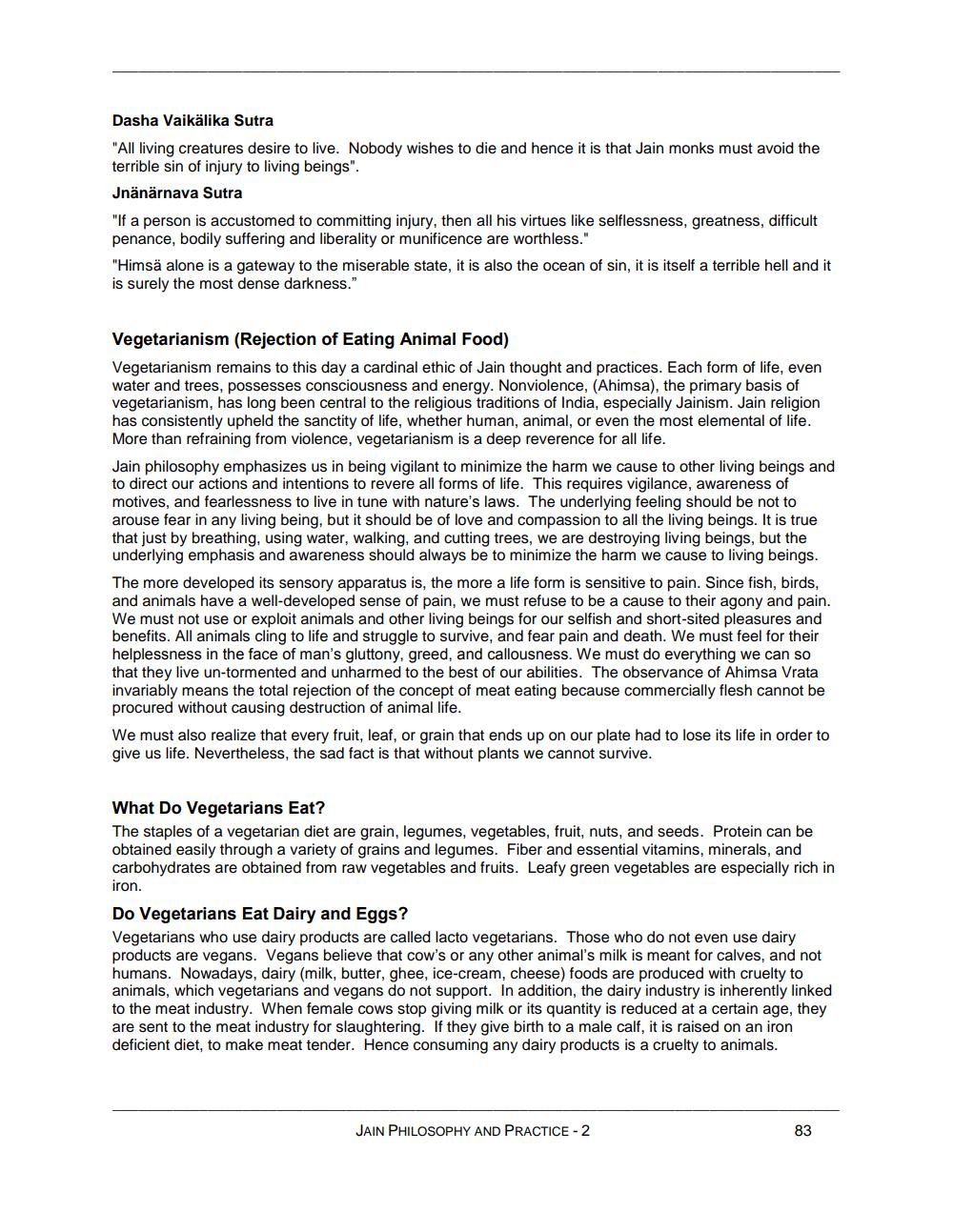________________
Dasha Vaikälika Sutra "All living creatures desire to live. Nobody wishes to die and hence it is that Jain monks must avoid the terrible sin of injury to living beings". Jnänärnava Sutra
"If a person is accustomed to committing injury, then all his virtues like selflessness, greatness, difficult penance, bodily suffering and liberality or munificence are worthless." "Himsä alone is a gateway to the miserable state, it is also the ocean of sin, it is itself a terrible hell and it is surely the most dense darkness."
Vegetarianism (Rejection of Eating Animal Food) Vegetarianism remains to this day a cardinal ethic of Jain thought and practices. Each form of life, even water and trees, possesses consciousness and energy. Nonviolence, (Ahimsa), the primary basis of vegetarianism, has long been central to the religious traditions of India, especially Jainism. Jain religion has consistently upheld the sanctity of life, whether human, animal, or even the most elemental of life. More than refraining from violence, vegetarianism is a deep reverence for all life. Jain philosophy emphasizes us in being vigilant to minimize the harm we cause to other living beings and to direct our actions and intentions to revere all forms of life. This requires vigilance, awareness of motives, and fearlessness to live in tune with nature's laws. The underlying feeling should be not to arouse fear in any living being, but it should be of love and compassion to all the living beings. It is true that just by breathing, using water, walking, and cutting trees, we are destroying living beings, but the underlying emphasis and awareness should always be to minimize the harm we cause to living beings. The more developed its sensory apparatus is, the more a life form is sensitive to pain. Since fish, birds, and animals have a well-developed sense of pain, we must refuse to be a cause to their agony and pain. We must not use or exploit animals and other living beings for our selfish and short-sited pleasures and benefits. All animals cling to life and struggle to survive, and fear pain and death. We must feel for their helplessness in the face of man's gluttony, greed, and callousness. We must do everything we can so that they live un-tormented and unharmed to the best of our abilities. The observance of Ahimsa Vrata invariably means the total rejection of the concept of meat eating because commercially flesh cannot be procured without causing destruction of animal life. We must also realize that every fruit, leaf, or grain that ends up on our plate had to lose its life in order to give us life. Nevertheless, the sad fact is that without plants we cannot survive.
What Do Vegetarians Eat? The staples of a vegetarian diet are grain, legumes, vegetables, fruit, nuts, and seeds. Protein can be obtained easily through a variety of grains and legumes. Fiber and essential vitamins, minerals, and carbohydrates are obtained from raw vegetables and fruits. Leafy green vegetables are especially rich in iron. Do Vegetarians Eat Dairy and Eggs? Vegetarians who use dairy products are called lacto vegetarians. Those who do not even use dairy products are vegans. Vegans believe that cow's or any other animal's milk is meant for calves, and not humans. Nowadays, dairy (milk, butter, ghee, ice-cream, cheese) foods are produced with cruelty to animals, which vegetarians and vegans do not support. In addition, the dairy industry is inherently linked to the meat industry. When female cows stop giving milk or its quantity is reduced at a certain age, they are sent to the meat industry for slaughtering. If they give birth to a male calf, it is raised on an iron deficient diet, to make meat tender. Hence consuming any dairy products is a cruelty to animals.
JAIN PHILOSOPHY AND PRACTICE - 2




